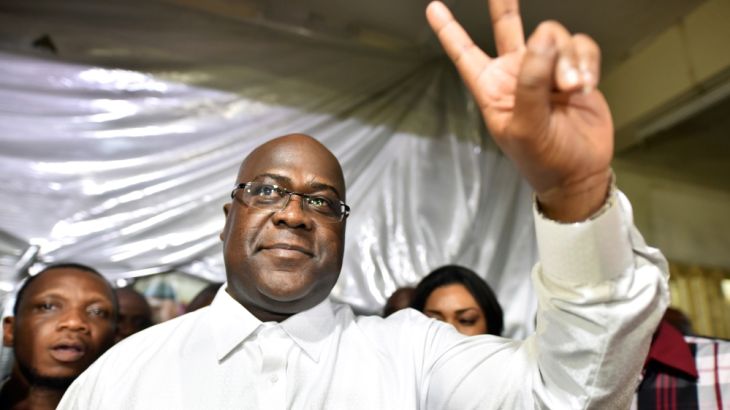Felix Tshisekedi sworn in as DR Congo president
In his speech before cheering supporters, Tshisekedi said the country will not be one of ‘division, hate or tribalism’.

Opposition leader Felix Tshisekedi has been sworn in as the president of the Democratic Republic of the Congo, succeeding Joseph Kabila in the vast central African country’s first transfer of power through an election in 59 years of independence.
In his speech before a cheering crowd of supporters on Thursday, Tshisekedi said that the country will not be one of “division, hate or tribalism”.
“We want to build a strong Congo in its cultural diversity. We will promote its development in peace and security. A Congo for each and everyone, where everybody has his or her own place,” he said.
|
|
Tshisekedi’s speech, however, was momentarily disrupted when he “collapsed on the podium”, according to Al Jazeera’s Fahmida Miller, who was at the inauguration in the capital Kinshasa.
Tshisekedi was able to resume after a few minutes.
Tshisekedi’s victory in the December 30 election was marred by accusations he struck a backroom deal with the outgoing president to deny victory to the strong opposition candidate, Martin Fayulu.
Kabila and Tshisekedi’s camps reject those allegations.
As Kabila looked on, Tshiskedi, in his speech, praised Fayulu, an outspoken critic of Kabila, describing him as a “soldier of the people,” and thanked the third-placed candidate Emmanuel Ramazani Shadary, who was Kabila’s preferred candidate.
Thousands of Tshisekedi supporters, many of them dressed in white, gathered outside the Palace of the Nation, the seat of the presidency in Kinshasa, to celebrate the grand event.
“We hope that this will be a real change, especially as he has taken power without bloodshed,” said Saddam Kongolo, a member of Tshisekedi’s Union for Democracy and Social Progress (UDPS).
One of Tshisekedi’s first tasks will be to appoint a prime minister in a move which will see him sharing power with Kabila’s supporters, who hold an overwhelming majority in the parliament.
Al Jazeera’s Miller said that Tshisekedi now faces the challenge of uniting the country after a divisive election.
![Tshisekedi's victory was marred by accusations that he struck a backroom deal with the outgoing president, Joseph Kabila [Jerome Delay/AP]](/wp-content/uploads/2019/01/15b9acf159244ff885dd34980ba53310_18.jpeg)
Tshisekedi needs to “speak to people who support Martin Fayulu, who said that the elections were rigged”, she said.
The ceremony caps more than two years of turmoil sparked by Kabila’s refusal to step down when he reached the constitutional limit on his term in office.
Turbulence
A country the size of continental western Europe, DR Congo has lived through two regional wars in 1996-97 and 1998-2003.
The last two presidential elections, in 2006 and 2011 – both won by Kabila, were marred by bloody clashes.
The ballot, which took place after three postponements, surprised many by the lack of violence, but a political storm swiftly brewed over the vote count.
|
|
Among foreign nations attending the ceremony, Kenya and Zambia were represented by their presidents and Tanzania by its vice presidents, according to the RTNC state television, while China, France, Japan and the United States sent their ambassadors, the journalists of AFP news agency saw.
“The opposition has run out of recourse to challenge the election results and the threat of widespread post-election violence is gradually subsiding,” said Robert Besseling of EXX Africa, a business risk consultancy.
Tshisekedi took over the UDPS, DRC’s oldest and largest opposition party, after the death of its founder, his father Etienne, about two years ago.
In his speech, Tshisekedi paid tribute to his father, referring to him as “president” – a nod to the late leader’s declaration of himself as president after losing the disputed 2011 election to Kabila.
Conflict and poverty
Beyond the challenge of uniting a fractured country, Tshisekedi also has to deal with the brutal militias who control parts of the country’s strife-torn east where an Ebola epidemic is also unfolding.
He also has to meet the expectations of his supporters about easing poverty, which afflicts the vast majority of the country’s 80 million citizens.
Despite poverty, DRC boasts a treasure trove of minerals, ranging from gold and diamonds to copper and coltan – a mineral essential for the batteries used in hand-held electronic devices.
Yet, in a country where corruption is entrenched, very little of the wealth trickles down to the poor. It ranks a mere 176th on the 189-nation Human Development Index compiled by the United Nations‘ Development Programme (UNDP).
On Thursday, Congolese largely appeared relieved to witness a peaceful change of power in a country with a history of violent overthrows.
DR Congo’s first leader, Patrice Lumumba, was removed in a military coup and assassinated in 1961.
Mobutu Sese Seko ruled for more than three decades but was overthrown in 1997 by rebel leader Laurent Kabila, who was assassinated in 2001. Kabila’s son, Joseph, took over at the age of 29.